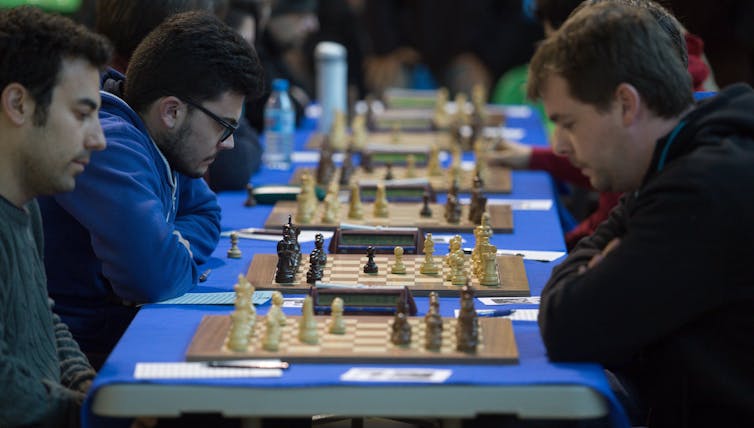Humans are exposed to air pollution almost everywhere. The World Health Organization estimate that 99% of the world’s population breathe in polluted air each day. Chess players competing indoors are no exception – and it can affect their performance.
You can listen to more articles from The Conversation, narrated by Noa, here.
A recent study conducted by researchers from Maastricht University (Netherlands) and the Massachusetts Institute of Technology (USA) analysed the quality of chess moves across multiple German chess tournaments. They found that chess experts perform worse when there is more particulate matter (PM2.5) in the air.
Some of the threats air pollution poses to human health are already known. For example, bad air increases the risk of suffering heart disease, strokes and certain cancers. But the recent research implies that poor air quality may be linked to a reduction in cognitive functioning.
This carries implications for anyone who makes decisions under pressure in polluted areas and may increase the global economic cost associated with air pollution. The World Bank estimates this cost to be US$8.1 trillion (£6.7 trillion) each year.
Keeping air pollution in check
The researchers studied the performance of 121 chess players across three separate tournaments between 2017 and 2019. They assessed more than 30,000 chess moves using computer software which identified optimal decisions and flagged significant errors.
A range of factors can interfere with a player’s performance. These include traffic noise, temperature and air pollutants including PM2.5 and CO₂. The authors investigated the impact of each and ruled out every factor apart from PM2.5.
Each tournament lasted eight weeks, so by measuring PM2.5 concentrations inside the tournament venue it was possible to determine how variations in air quality were related to changes in player performance. Throughout the tournaments, concentrations of PM2.5 varied from 14 to 70 micrograms (μg) per cubic metre of air. Exposure to such concentrations is common in many cities around the world and is classified as moderate to unhealthy by the US Environmental Protection Agency.
For a modest increase in PM2.5 (10 μg per cubic metre of air), chess players were 26.3% more likely to make an error. The computer analysis judged the errors they made were 10.8% worse that an optimal move would have been.
But the impact of air quality on play increased when players were under more pressure. The tournaments required 40 moves to be made within 110 minutes, which induced higher time pressure in the game’s later stages. For the same increase in PM2.5, chess players made larger errors later in the game. In the final ten moves, when maximum concentration is needed, the size of the errors increased by 20.2% for players in the lowest quality air compared with players in normal air.

Making us less intelligent
The idea that cleaner air leads to sharper thinking among chess players is consistent with growing evidence linking air quality to short-term cognitive performance.
Analysis of daily air pollution data in China revealed a negative relationship between air quality and stock returns from 2005 to 2014. This effect was weaker for companies which had taken measures to address poor air quality. The authors of the study linked poor air quality to creating a depressed mood among investors.
Research that I co-authored in 2016 into the effects of short-term indoor and outdoor PM2.5 exposure also revealed that exposure to burning candles and commuter traffic negatively impacts cognitive functioning. The participants took three cognitive tests both before and after an hour of PM2.5 exposure and performed significantly worse on average in the post-exposure testing.
Epidemiological evidence also suggests that exposure to high levels of air pollution at critical points in a person’s life (particularly at a young age) can be detrimental to brain health and lead to dementia or Alzheimer’s disease later in life.
While the factors affecting cognition and dementia are not yet fully understood, this evidence met many of the Bradford Hill guidelines for causality. These criteria evaluate epidemiological evidence to determine whether there is a causal relationship.
Technology is changing the global labour market and jobs are becoming increasingly sophisticated as a result. Between 1995 and 2015, the proportion of high-skilled occupations as a share of total employment increased by roughly 5% in North America and almost 8% across Europe. At the same time, the share of middle-skilled occupations in total employment declined in both regions.
But those who work in high-tech industries such as data science are also required to make complex decisions under pressur. The workplace performance of these professionals will likely also be affected by poor air quality. Chess experts, who are studied for their ability to make complex decisions under stressful conditions could therefore be the canary in the coal mine for workplace productivity among highly skilled professionals.

Air pollution poses such a threat to strategic thinking under pressure that chess players often monitor the air quality of their surroundings. But the mechanism through which air pollution affects their (and everyone else’s) cognition remains largely unclear. Research must determine precisely which pollutants are most damaging to cognitive health so that a global recognised safe air quality level can be established.

Don’t have time to read about climate change as much as you’d like?
Get a weekly roundup in your inbox instead. Every Wednesday, The Conversation’s environment editor writes Imagine, a short email that goes a little deeper into just one climate issue. Join the 10,000+ readers who’ve subscribed so far.

